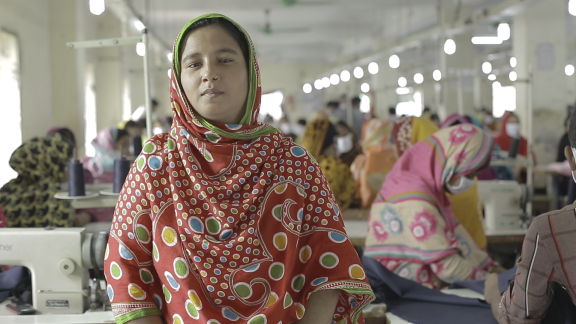Jasmin Akter, 23, is a married female garment worker from the poverty stricken northern district of Gaibandha in Bangladesh. Gaibandha is situated some 200 kilometres away from the capital Dhaka. Jasmin was brought up there with her sister and two brothers in a small hut made of straw and bamboo. She was enrolled in primary school and continued up until class five. Her father was a day labourer, he worked on agricultural farms where he earned a very low income. He died when Jasmin was only sixteen.
The family was left in an extremely vulnerable position, and there were no options open for them to earn a living. At the time, Jasmin and her mother were working for their wealthy neighbours, offering domestic help in return for two daily meals, which they had to share with three other young family members. The situation was unbearable, and they found it increasingly difficult to carry on.
Like other girls of her age in Bangladesh, Jasmin would have been a victim of child marriage, had it not been for the support of some neighbouring young women, who helped her to escape. She fled to Gazipur, the adjacent district to Dhaka, with some female garment workers from her community. After a couple of months, in 2010, she got a job with an export oriented garment factory as a ‘Helper’. Now, after five years, she is working as a Sewing Machine Operator and earns around US$300 a month.
Jasmin got married in 2012. Her husband also works in the garment factory. Unlike some other young couples, Jasmin and her husband made the decision to delay pregnancy and Jasmin took the long-lasting family planning method ‘Implanon’ as contraceptive.
Jasmin explains why they made this decision:
“My job is very important to me. I struggled to make a living. I know I need to continue with my job to support my family. I have watched the suffering of other young girls who were also working in different garment factories. They got married and after a couple of months or sometimes a year, they became pregnant, became a mother. After managing all the household chores and baby care, they could not continue with their jobs. I don’t want this to happen to me.”
The garment industry earns the highest foreign remittance for Bangladesh. The country is the second highest garment manufacturer and exporter in the world. Around 3.4 million workers, of which 80% are female, are employed in garment factories. Most of the workers are young, with low literacy levels and they come from rural areas. Due to the demands of the job, the long working hours and the confined working environments, garment workers often do not have the opportunity to access family planning and health care services. Such lengthy work shifts also mean that garment workers often miss out on the usual outreach health and family planning services offered by the NGOs.
“Before my marriage,” Jasmin says, “I was sharing a bed in a small room with three other female colleagues at Gazipur. I met several Reproductive Health Educators from the Family Planning Association of Bangladesh (FPAB). FPAB conduct outreach works to promote family planning among the female community in that area. During some of my holiday evenings, I used to attend those sessions on family planning with my colleagues and friends. I learnt about family planning from those sessions. It was interesting, family planning is not all about birth control, it is about women’s health, family planning keeps different avenues open for economic engagement and saving women’s and girls’ lives.”
“Without family planning,” Jasmin continues, “I would not have been able to reach this level in my job. This is not about the associated expenditure of a baby but the care and safety of the baby. No matter how much I am earning, the important thing is that I am earning something myself, it gives me a lot of confidence. If I had become a mother at such an early age, I am afraid I would not have been able to help my baby and hold down a job as well. I do dream of being a mother, maybe in one year, after becoming more settled in my job and conjugal life.”
At the London Family Planning Summit in 2012, the Minister of Health from Bangladesh made several commitments to improve the quality and access to reproductive health services for women and adolescents. The government committed US40 million per year and 400 million in total by 2021 to minimize the resource gap for family services and to eliminate the geographical disparity and inequity between urban and rural, and between rich and poor. Such a commitment will help garment workers like Jasmin to have access to family planning and to make informed choices about the contraceptive methods that are best for them.
when
Blog Series
Expanding access
Subject
Contraception








